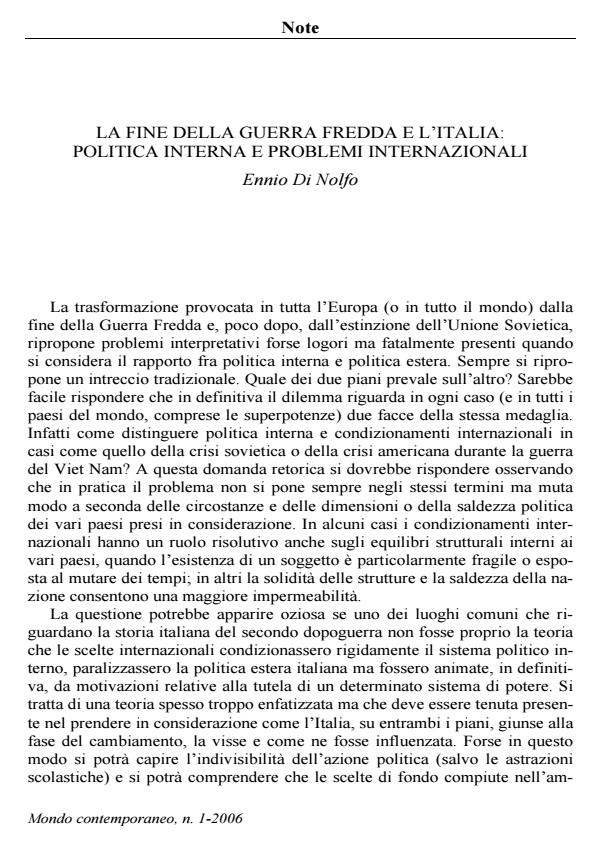La fine della guerra fredda e l'Italia: politica interna e problemi internazionali
Titolo Rivista MONDO CONTEMPORANEO
Autori/Curatori Ennio Di Nolfo
Anno di pubblicazione 2006 Fascicolo 2006/1 Lingua Italiano
Numero pagine 20 P. Dimensione file 142 KB
DOI
Il DOI è il codice a barre della proprietà intellettuale: per saperne di più
clicca qui
Qui sotto puoi vedere in anteprima la prima pagina di questo articolo.
Se questo articolo ti interessa, lo puoi acquistare (e scaricare in formato pdf) seguendo le facili indicazioni per acquistare il download credit. Acquista Download Credits per scaricare questo Articolo in formato PDF

FrancoAngeli è membro della Publishers International Linking Association, Inc (PILA)associazione indipendente e non profit per facilitare (attraverso i servizi tecnologici implementati da CrossRef.org) l’accesso degli studiosi ai contenuti digitali nelle pubblicazioni professionali e scientifiche
The essay looks at the repercussions of the end of the Cold War on Italy’s domestic politics and foreign policy, criticising the stereotype of an internal political system heavily conditioned by the international one. Refusing this assumption, the author argues that the basic continuity of the Italian domestic system is above all the result of the country’s internal balance of power, upon which international influences have only a limited impact mostly when the internal elites decide to use them to reinforce their position. The essay then describes the evolution of Italian politics since the mid 1970s by exploring the interplay between the country’s three main political forces, the DC, the PCI and the PSI. Faced with an apparently insoluble stalemate between a declining DC and a PCI which could not force itself to break free from its original ideological attachment to the USSR, the Socialist party tried to revolutionize the essential bipolarism of Italian politics by becoming a third dominant force a project which ran into the opposition of the two other major parties and was therefore almost doomed from the start. The resulting failure to renew the structural flaws of the domestic political system entailed its total collapse in the early 1990s, making it more difficult for Italy to grasp the opportunities offered to its foreign policy by the end of the Cold War. In the last part of the essay, the author looks at the structural interests of Italian foreign policy in the post-Cold war era, stressing their continuity from the Middle East to the Balkans with some of its basic outlines since the unification of the country.;
Ennio Di Nolfo, La fine della guerra fredda e l'Italia: politica interna e problemi internazionali in "MONDO CONTEMPORANEO" 1/2006, pp , DOI: